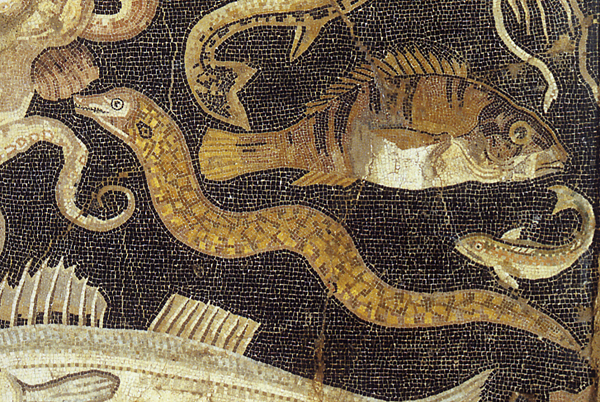
Consul in 151 BC, Lucius Licinius Murena is said by Pliny to have invented fishponds (Natural History, IX.lxxxi.170; Columella, On Agriculture, VIII.16.5), his cognomen deriving from the murenae that he raised there. Although translated in the Loeb editions as "lampreys," the word more appropriately signifies eels or morays. Gaius Hirrius, the first person to have ponds solely for raising eels, supplied six thousand to Caesar for his triumphal banquets and eventually sold his estate for four million sesterces (Pliny, IX.lxxxi.171; Macrobius, Saturnalia, III.15.9; Varro, On Agriculture, III.17.3, who says that two thousand were provided). After the death of Lucullus, the same amount was paid just for the fish from his pond (Macrobius says forty thousand eels and Columella, four hundred thousand). The orator Quintus Hortensius, who lavished such care on his fishpond, is said to have wept when his favorite murena died (Pliny, IX.lxxxi.171). Another pet murena, kept there by Antonia, the niece of Augustus, was adorned with earrings, which prompted some to visit and witness the spectacle. (Here, an eel must be meant, given that the lamprey and moray have no pectoral fins on which to hang such ornaments.)
Crassus, too, was said to have adorned a pet eel with earrings and small necklaces "just like some lovely maiden," training it to respond to its name and swimming up to eat what was offered. Rebuked by Domitius for weeping upon the death of the creature, he retorted that his accuser had buried three wives without shedding a tear (Aelian, On the Characteristics of Animals, VIII.4; Plutarch, De sollertia animalium, 976a; Macrobius, III.15.3).
The praenomina are not given, and the Loeb translations footnote both Lucius and Gnaeus Domitius Ahenobarbus. The other protagonist is identified as Marcus Licinius Crassus, who had defeated Spartacus in 73 BC and was a member of the Triumvirate in 60 BC. If the identification of Crassus is correct, Lucius Domitius must be meant, consul in 54 BC and the bitter rival of Crassus, who had him assaulted in the Forum (Plutarch, Crassus, XV.4). But if Gnaeus Domitius is intended (as Macrobius indicates), the father of Lucius and censor in 92 BC, then the Crassus of the story must be the orator Lucius Licinius Crassus, who shared the censorship that year. Such a rebuke would seem appropriate, Gnaeus Domitius calling Lucius Crassus a hypocrite as censor for weeping over the death of a pet eel, which was considered an expensive luxury item.
This detail from a mosaic in Pompeii depicts the Mediterranean moray eel (Muraena helena). It now is in the Museo Archeologico Nazionale di Napoli (Naples).
References: "Crassus' Slippery Eel" (1974) by Allen M. Ward, The Classical Review, 24, 185-186; Aelian: On the Characteristics of Animals (1958) translated by A. F. Scholfield (Loeb Classical Library); Plutarch's Moralia (1957) translated by Harold Cherniss and William C. Helmbold (Loeb Classical Library).